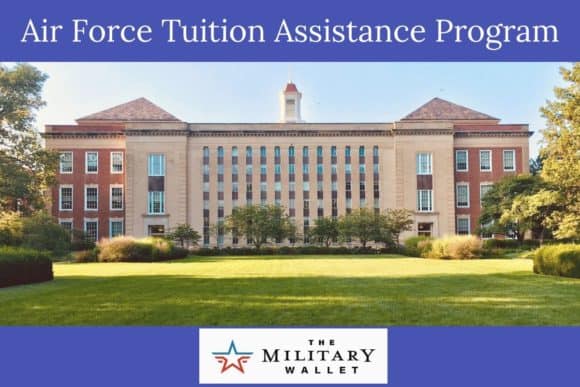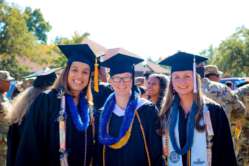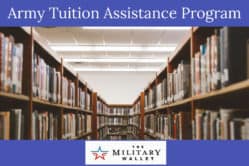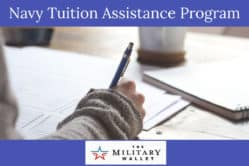Table of Contents
The military is well-known for offering its troops the opportunity to attend school. Education is often among the reasons many people enlist in the military. Thankfully, each military branch offers Tuition Assistance benefits to help members pay for college courses or other approved training; the Air Force is no exception.
Education benefits were certainly one of the reasons I chose to enlist in the Air Force, and I used the Tuition Assistance program to get my degree while on active duty. I also tested out of many classes en route to achieving my degree.
Achieving my Bachelor’s Degree while serving on active duty was huge because it gave me options when my enlistment was up. I had the choice to reenlist, apply for Officer Training School (OTS), or separate from active duty, knowing that I had a four-year degree and real-world experience.
Each person’s situation is unique, but at that point in my life, I decided to separate from the military to start my life in the civilian world.
Because I used Tuition Assistance benefits to obtain my degree, I still have the Post 9/11 G Bill if I want to go back to school to get a different degree or if I want to go for a Master’s Degree.
In other words, Tuition Assistance benefits were extremely valuable to me because they saved me a lot of time and money, and helped me hit the ground running after I separated from active duty.
If you are in the US Air Force or are considering joining, I strongly encourage you to familiarize yourself with the Air Force Tuition Assistance Benefits. You can do a lot to advance your career by obtaining your Community College of the Air Force (CCAF) degree, obtaining a Bachelor’s or Master’s Degree, applying to OTS, or simply taking classes you enjoy.
The best part is that you can take these classes while in the service to get ahead of the curve when you separate, whether after your first term or if you make the Air Force a career.
Air Force Tuition Assistance Benefits
Here are the current Air Force Tuition Assistance benefits for FY 2024:
The maximum amount paid for Tuition Assistance: 100% Tuition and Fees, not to exceed:
- $250 per Semester Credit Hour, or
- $166 per Quarter Credit Hour, and
- $4,500 per Fiscal Year
$4,500 Lifetime Limit for AF COOL Boot Camps
Air Force members can also take online preparatory classes or boot camps through the Air Force Credential Opportunities Online (COOL) program. AF COOL funding limits are capped at $4,500 per member throughout their military career.
What if your tuition costs more than the limit?
For most community colleges and state schools, $250 a semester hour is enough. You may be able to find ways to pay for the difference if your chosen school charges more per semester hour. Many other universities, particularly those near military installations, will reduce the tuition costs for active duty military members to align with current Tuition Assistance rates.
You may also be able to qualify for grants such as the Pell Grant, or you may be able to qualify for military scholarships through the school or other organizations.
Finally, you can use your GI Bill to cover any difference in the cost of tuition, so you don’t have to spend anything out of pocket. You can pay out of pocket if you choose not to use your GI Bill. The good news is that using your GI Bill only counts toward a prorated portion of your monthly benefit if you only use it to top-up your Tuition Assistance.
Applying for Tuition Assistance Benefits
You must visit your Education Center or apply online through the Air Force Virtual Education Center in the Air Force Portal.
There are certain instances when you cannot apply for TA benefits online. These include:
- missing personal data in your education record,
- not having a degree plan on record,
- requesting Tuition Assistance for courses that have already started or are more than 30 days in the future,
- missing grades for courses you completed over 60 days ago,
- or requesting Tuition Assistance for coursework in a degree plan lower than your highest awarded degree (see next section).
All Tuition Assistance Funding Requests must be approved by supervisors via the Air Force Virtual Education Center (AFVEC) and fall within the TA application window of 45 calendar days before, and no later than seven calendar days before, the term start date. Any TA not “supervisor” approved by prescribed start dates will be auto-deleted, and a notification will be sent to the prospective student.
Maintain Good Grades – Or You May Have to Reimburse the AF
The Air Force requires Tuition Assistance recipients to successfully complete all courses paid for with TA funds. Successful course completion is defined as a final grade of “C” or higher for undergraduate courses and “B” or higher for graduate courses (“Pass” for “Pass/Fail”).
Airmen may be required to reimburse the Air Force when they earn grades of “D” or “F” in undergraduate courses and “C,” “D,” or “F” in graduate courses.
Grades must be reported within 90 days after the term end date, or the Central Tuition Assistance Office will initiate reimbursement actions for missing grades (from the term end date). Once reimbursement actions begin, they cannot be stopped or refunded.
Airmen who sign the military tuition assistance form, MilTA Form 1227, authorize funds to be withdrawn from their military pay if they earn unsatisfactory grades, fail to complete a course, or fail to report their grades.

Check your VA Home Loan eligibility and get personalized rates. Answer a few questions and we'll connect you with a trusted VA lender to answer any questions you have about the VA loan program.
Limitations on Usage – How You Can Use Your TA
Tuition Assistance is designed to help Airmen achieve certain degrees and education levels. It is also designed to benefit the Air Force. Because of this, you can only use Tuition Assistance benefits to achieve a degree higher than your current degree. For example, you cannot use the Tuition Assistance program to achieve a second Associate’s, Bachelor’s, or Master’s degree.
There are some exceptions to this rule. You can always use Tuition Assistance to achieve another CCAF degree, regardless of your current degree level.
You can also use Tuition Assistance to achieve an Associate’s Degree from a civilian college if you already have your CCAF, provided your civilian Associate’s is in a different subject, and you do not already have an Associate’s or Bachelor’s degree.
Finally, you may be eligible to obtain a second Master’s Degree if it is on an approved list of critical education programs. Some examples of critical education programs include certain graduate foreign language/affairs programs and cyber law master’s degrees.
Tuition Assistance is also limited to Master’s Degree level courses. There are other ways to get the Air Force to pay for a post-graduate course or doctoral degree, but these are generally specialized programs and highly competitive. You will need to contact your education office for a list of current programs for this level of education. Remember that you may incur a service commitment for this type of training.
Limitations on Air Force Tuition Assistance Participation
Keep in mind there may be some exceptions to being able to use Tuition Assistance Benefits. These benefits are generally open to all active duty members, but your personal or professional circumstances may temporarily prevent you from being able to use the benefits.
For example, you generally cannot use Tuition Assistance benefits in a formal training environment such as Basic Military Training, OTS, tech school, Professional Military Education (PME), Squadron Officer School, etc.
Supervisor approval is required to receive Tuition Assistance Benefits. Supervisors may decline permission for any of the following reasons:
- The Airmen is in any level of upgrade training,
- The Airman will be TDY or will be PCSing during the academic term,
- The Airman is enrolled in Professional Military Education (PME),
- or for any other factors the supervisor determines would impede the Airman’s ability to complete the course.
Airmen who fail to meet Air Force standards may also be ineligible to use Tuition Assistance benefits. Some examples include:
- Airmen who have unfavorable information files,
- Airmen who failed/overdue physical fitness testing, and
- Airmen who received referral performance reports or are on a control roster will automatically be denied.
- Foreign language courses are only approved as part of a degree or if on the approved shortage list
The rules on this page pertain to Active Duty Airmen or activated Guard and Reserve members. Traditional Guard and Reserves members have different Tuition Assistance benefits rules and eligibility, which will be covered in a different article.




About the comments on this site:
These responses are not provided or commissioned by the bank advertiser. Responses have not been reviewed, approved or otherwise endorsed by the bank advertiser. It is not the bank advertiser’s responsibility to ensure all posts and/or questions are answered.